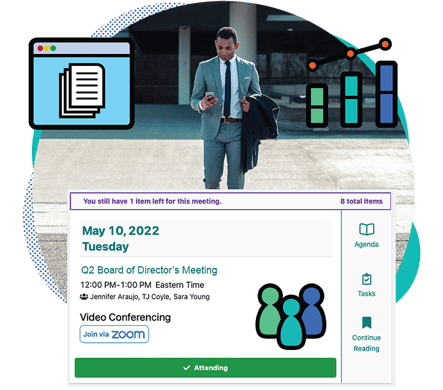 Our world may be far from the human-like hosts of HBO’s Westworld and rabbit-hole choices between red pills or blue pills, but Artificial Intelligence is creeping its way into our daily lives and currently affecting the way we do business and conduct corporate governance. Have you asked Alexa about the weather today, used your face to unlock your iPhone, or arrived at the airport in an autonomous Uber? These menial tasks are just the beginning of the rapidly evolving technology buzz of AI. Its presence in our daily lives is evident, but the implications of Artificial Intelligence in corporate governance and the business world is indisputable.
Our world may be far from the human-like hosts of HBO’s Westworld and rabbit-hole choices between red pills or blue pills, but Artificial Intelligence is creeping its way into our daily lives and currently affecting the way we do business and conduct corporate governance. Have you asked Alexa about the weather today, used your face to unlock your iPhone, or arrived at the airport in an autonomous Uber? These menial tasks are just the beginning of the rapidly evolving technology buzz of AI. Its presence in our daily lives is evident, but the implications of Artificial Intelligence in corporate governance and the business world is indisputable.
The medical field is already seeing the benefits of incorporating AI technology into intricate and important decision-making processes. AI is currently mapping the human genome, collecting vast amounts of clinical data, and delivering more individualized treatment plans. AI can now assess patient profiles, analyze research, find patterns across patients, and prioritize a course of action. MIT Sloan Management Review reports, “In a recent study, physicians who incorporated machine-learning algorithms in their diagnoses of metastatic breast cancer reduced their error rates by 85%.” The early use of AI in the medical field shows a promising and impressive future for this technology. MIT goes on to say that the medical field is paving the way for artificial intelligence in corporate governance and that executives and board members can learn from AI advancements in the medical field, “Physicians, like executives and board members, spend years developing their expertise. They evaluate existing conditions and deploy treatments in response, while monitoring the well-being of those under their care.”
Closing the Performance Gap with AI Executives
McKinsey Global Institute published a survey of more than 3,000 AI-aware companies from around the world. They found that “early AI adopters that combine strong digital capability with proactive strategies have higher profit margins and expect the performance gap with other firms to widen in the next three years.” Artificial intelligence in corporate governance can offer companies next-level problem solving, market predictions, and risk management procedures far more advanced than legacy practices. McKinsey Global goes on to state, “Early evidence suggests that there is a business case to be made, and that AI can deliver real value to companies willing to use it across operations and within their core functions.” Salesforce CEO Marc Benioff is just one executive utilizing the data-driven analysis of artificial intelligence in corporate governance.
 Benioff uses an unreleased version of the company’s AI product, Einstein, to help him make better decisions as CEO. Business Insider reports that Einstein accompanies him to staff meetings every Monday morning. Benioff says, “We have our top 20 or 30 executives around the table. We talk about different regions, different products, different opportunities. And then I ask one other executive their opinion, and that executive is Einstein.” Einstein provides Benioff with data-driven analysis of quarter performance, strengths, weaknesses, and specific executives that may need close attention. He goes on to say that he has the ability to ask Einstein anything and everything. “Einstein comes without bias. So because it’s just based on the data, it’s a very exciting next-generation tool.” Benioff even says that Einstein has transformed him as a CEO.
Benioff uses an unreleased version of the company’s AI product, Einstein, to help him make better decisions as CEO. Business Insider reports that Einstein accompanies him to staff meetings every Monday morning. Benioff says, “We have our top 20 or 30 executives around the table. We talk about different regions, different products, different opportunities. And then I ask one other executive their opinion, and that executive is Einstein.” Einstein provides Benioff with data-driven analysis of quarter performance, strengths, weaknesses, and specific executives that may need close attention. He goes on to say that he has the ability to ask Einstein anything and everything. “Einstein comes without bias. So because it’s just based on the data, it’s a very exciting next-generation tool.” Benioff even says that Einstein has transformed him as a CEO.
Data-Driven Decision Making with Artificial Intelligence in Corporate Governance
The success of AI assistants in the C-suite are making their way farther up the corporate ladder into boardrooms around the globe. Artificial intelligence in corporate governance is becoming a necessity in one Hong Kong-based company. Venture capitalist fund, Deep Knowledge Ventures attributes their AI board member, Vital, for advising them against a potentially catastrophic decision. “Dmitry Kaminskiy, managing partner of Deep Knowledge Ventures, believes that the fund would have gone under without Vital because it would have invested in ‘overhyped projects,’” reports the Nikkei Asian Review. It all started with collecting vast amounts of data in the biotechnology field and analyzing the data sets to reveal patterns. Nikkei continues, “The team created Vital, the first artificial intelligence system for biotech investment analysis, enabling the fund to identify more than 50 parameters that were critical for assessing risk factors.” Kaminskiy says that they treat Vital as a member of the board with observer status. “As a board, we agreed that we would not make positive investment decisions without corroboration by Vital.” He also feels that artificial intelligence in corporate governance creates tools in the boardroom that will increasingly be used for decision-making in the future.
Boards of directors are going to see more artificial intelligence in corporate governance and as board members next to them in coming years if they want to compete in data-driven decision making. McKinsey estimates that external spending on AI-related projects went up to $12 billion in 2016. “The truth is the business has become too complex and is moving too rapidly for boards and CEOs to make good decisions without intelligent systems,” says MIT Sloan. This sentiment about the impact of artificial intelligence in corporate governance is echoed by Mark van Rijmenam, “AI can help streamline decision-making processes, transform big decisions from gut feelings to data-driven knowledge, and better predict the future outcome of such decisions.”
 The true advantage of artificial intelligence in corporate governance is the ability to gather and analyze data. McKinsey says, “Computer algorithms and AI models are becoming more sophisticated, and, perhaps most important of all, the world is generating once-unimaginable volumes of the fuel that powers AI- data.” Boardroom decisions are often made with little data analysis and an emphasis on gut feelings. But with artificial intelligence in corporate governance, board members’ decisions can be based on the analysis of corporate patterns and industry trends. AI does not merely replace board members but augments already intelligent guidance. Data-driven decisions supplemented with AI will improve capital allocation, disbursement of funds, investment guidance based on industry patterns, and risk management. Mark van Rijmenam explains that companies are utilizing artificial intelligence in corporate governance to help the general counsel by forecasting the outcomes of corporate lawsuits. “Avoiding hefty legal fees or investing in the right legal counsel gives a corporation a huge advantage over the competition.” AI ‘board members’ will even be able to predict government pushback to mergers. The competitive advantage of integrating artificial intelligence in corporate governance is essentially endless.
The true advantage of artificial intelligence in corporate governance is the ability to gather and analyze data. McKinsey says, “Computer algorithms and AI models are becoming more sophisticated, and, perhaps most important of all, the world is generating once-unimaginable volumes of the fuel that powers AI- data.” Boardroom decisions are often made with little data analysis and an emphasis on gut feelings. But with artificial intelligence in corporate governance, board members’ decisions can be based on the analysis of corporate patterns and industry trends. AI does not merely replace board members but augments already intelligent guidance. Data-driven decisions supplemented with AI will improve capital allocation, disbursement of funds, investment guidance based on industry patterns, and risk management. Mark van Rijmenam explains that companies are utilizing artificial intelligence in corporate governance to help the general counsel by forecasting the outcomes of corporate lawsuits. “Avoiding hefty legal fees or investing in the right legal counsel gives a corporation a huge advantage over the competition.” AI ‘board members’ will even be able to predict government pushback to mergers. The competitive advantage of integrating artificial intelligence in corporate governance is essentially endless.
The Global Future of Artificial Intelligence in Corporate Governance
AI is going to continue to grow exponentially and is often termed as the next frontier in technology. PWC reports that global investment in AI technology will be $15.7 trillion by 2030. The United States has one of the best AI plans that could boost the economy and bolster national and cybersecurity. However, China has taken center stage in the race to become a global AI powerhouse. Other global AI leaders include the UK, Canada, Japan, and Germany. Although many countries are taking initiatives to develop AI, workers worry the technology could replace their jobs in the near future. Economists argue that AI will create more opportunities for employment. The question still remains unclear as this new pioneer in technology continues to grow and develop. However, it is evidently clear that artificial intelligence in corporate governance is not only transforming the way boards make decisions but weaving its way into our daily lives and currently taking a seat at staff meetings.
Other posts you might be interested in
View All Posts
Family Business Evolution with Board Governance
Read More
What is Corporate Governance?
Read More
Employee Representation on Boards: Could History Repeat Itself?
Read MoreSubscribe to email updates
Get updates delivered directly to your inbox.
 Solution Showcase:
Solution Showcase: 5 Ways to Build Better Board Meeting AgendasOctober 29 at 2:00 PM ET
5 Ways to Build Better Board Meeting AgendasOctober 29 at 2:00 PM ET